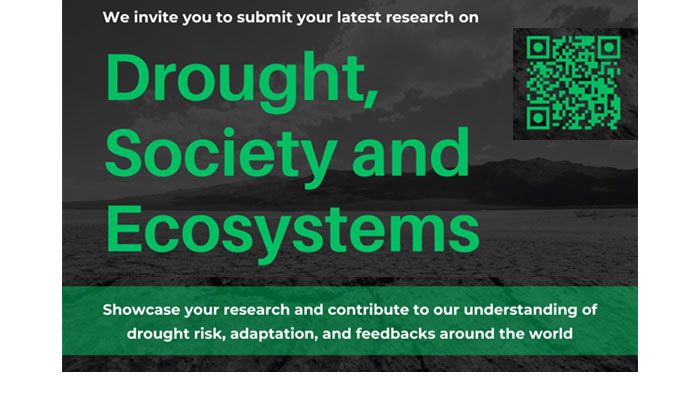
Are you a scientist, researcher, student, practitioner, or stakeholder with an interest in the complex phenomenon of drought and its impacts on societies and ecosystems? If so, we have exciting news for you! The IAHS Panta Rhei scientific decade (2013-2023) working group “Drought in the Anthropocene” (DitA) is advertising an inter-journal special issue entitled “Drought, Society and Ecosystems” together with the Copernicus journals Natural Hazards and Earth System Sciences (NHESS), Hydrology and Earth System Sciences (HESS), Geosciences Communication (GC), and Biogeosciences (BG). This special issue aims to showcase interdisciplinary research on drought-society-ecosystem interactions. The goal is to advance our understanding of drought risk, adaptation, and feedbacks, which are essential to prepare for future droughts. The guest editors are looking for contributions from different perspectives, including commentaries, reviews, and original research articles.
An inter-journal special issue
The co-listing of this special issue under the Copernicus journals NHESS, HESS, GC, and BG allows for more diversity in perspectives. We invite contributions on many drought-related topics, including drought risk analysis, detection and attribution of drought (the hazard and its impacts), water security in diverse contexts, drought risk management and communication, co-creation of drought information services, drought in (socio-)ecological systems, drought and the food-water-energy-environment nexus, influence of human activities on drought hazard, socio-hydrology of human-drought interactions, drought and vulnerability (in ecological and/or social systems), drought adaptation (in ecological and/or social systems), climate change impacts on drought / water security, etc.
IAHS working group “Drought in the Anthropocene” (DitA)
The DitA aims to deepen the understanding of drought-society feedbacks: the influence of people on drought and the impact of drought on people, both positive and negative. The special issue originated from the latest Panta Rhei Drought in the Anthropocene workshop in 2022 in Uppsala, Sweden, which brought together an interdisciplinary group of international early-career and experienced scientists in the field of human-drought interaction. The main goal of the workshop was to identify key challenges and opportunities for future drought research in the Anthropocene, through keynote seminars, plenary discussions, and group work brainstorming. Using an online survey of all DitA members, we narrowed down the workshop topics into the two main themes Drought Impacts and Socio-hydrological Interactions. The former theme covered 2 groups of “drought impacts, compound cascading events, systemic risks/impacts” and “drought impacts & water supply & food security“, and the latter covering “drought as hazard in the Anthropocene” and “adaptation and human responses“.
The editorial team of guest editors
The guest editors (see below) aim for diversity and balance in contributions and authors, encouraging researchers from countries underrepresented in science, women, and minorities to contribute to this special issue. The special issue welcomes manuscripts with diverse authorships and case studies in different geographic regions that address various themes related to drought.
If you have research on drought that you would like to showcase and contribute to our understanding of drought risk, adaptation, and feedbacks, we encourage you to submit your abstracts and manuscripts for this special issue on “Drought, Society and Ecosystems.” Let’s collaborate and create a unique opportunity to advance interdisciplinary research on this pressing global challenge. Let’s end the drought in drought research!
How to submit?
The submission goes via the four journals involved in the special issue:
- NHESS: https://www.natural-hazards-and-earth-system-sciences.net/articles_and_preprints/scheduled_sis.html
- HESS: https://www.hydrology-and-earth-system-sciences.net/articles_and_preprints/scheduled_sis.html
- GC: https://www.geoscience-communication.net/articles_and_preprints/scheduled_sis.html
- BG: https://www.biogeosciences.net/articles_and_preprints/scheduled_sis.html
We look forward to receiving your contributions!
 The editorial team
The editorial team
- Anne Van Loon (IVM – VU Amsterdam, The Netherlands)
- Gemma Coxon (Bristol University, UK)
- Camila Alvarez-Garreton (Center for Climate and Resilience Research CR2, Chile)
- Elena Toth (University of Bologna, Italy)
- Shreedhar Maskey (IHE Delft Institute for Water Education, The Netherlands)
- Khalid Hassaballah (IGAD Climate Prediction Centre, Kenya)
- Floris van Ogtrop (University of Sydney, Australia)
- Noemi Vergopolan (Princeton University, NOAA-GFDL, United States)
- Sina Khatami (Uppsala University, Sweden; University of Melbourne, Australia)
